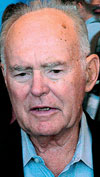

A well-known and oft-quoted phenomenon in the electronics industry, Moore's Law postulates that the number of transistors that can be inexpensively placed on an integrated circuit increases exponentially, doubling approximately every two years.
Incredibly, this trend has continued for more than half a century. Gordon Moore, founder of Intel and the man behind the Law, recently took to the stage at the Intel Developer Forum for an informal reflection on his personal and working life.
When asked how he was recruited in the 1960s by William Shockley, one of the inventors of the transistor, he responded, "There was hardly any e-mail in those days, I am afraid. We had telephones, however. The kind you put your finger in."
On the first days of ICs: "There were a lot of questions about integrated circuits in the early days. There were all kinds of arguments why they did not make sense. One of the principal ones was yield. People knew that on transistors, we only got yields of maybe 20% on a wafer in those days. And if you put eight transistors on a circuit, people thought you took 0,2 to the eighth power, and that was the yield you were going to get, which would not make them very inexpensive. And so, the idea that in fact you got yields in integrated circuits comparable to what you got in individual transistors was something that took some selling. Also, people thought that these things could not possibly be reliable, because they could not go in and measure the parameters of the individual transistors and resistors."
Regarding Intel's shock introduction of cubicles in its working space: "We were going to have hallways lined up both sides with doors with offices in them, no windows. It was going to look like a, I do not know, a prison block or something. And the alternative was leaving the space a lot more open. So we went ahead and did it with the cubicles that were available at the time. I still have the largest cubicle at Intel, I think. I got that because I had a big round table, and it would not fit in the small ones. I kept that table, therefore I kept my cubicle."
On the company's name: "We went through a lot of names. Bob Noyce's daughter wanted to call it Moore Noyce Electronics. We were originally incorporated as MN Electronics. We had four or five names rejected before we finally got Intel approved. Then we ended up having to buy the name Intel from a motel company in the Midwest."
Regarding IC pricing: "My colleague Bob Noyce made another major contribution to the industry beyond inventing the practical integrated circuit. He says, 'We will sell you the integrated circuits for less than the sum of the costs of the individual components.' That really changed the economics of the industry. Of course, it was considerably less than the cost they used to make them in those days, but that is not unusual in the semiconductor industries. We made it up in volume: as the volume increases and things improve, the costs go down. Eventually, you do get ahead of the curve."
When asked what he would study if he were starting out now, Moore responded: "I would probably look into the biological end of things. I think the most important things - the most exciting things - are usually at the interfaces. And the interface between computers and biology right now I think is a very productive area, dealing with extremely complex things, doing things that would not be possible without computers."
On transistor costs: "When we were making individual transistors, before we thought about integrated circuits, the people at Western Electric, the manufacturing arm of AT&T, did one of their time-in-motion studies, looking at materials and everything to see what a transistor ought to cost eventually. And it was, I think, 68 cents (US) is what they imagined. You could eventually get a transistor down to 68 cents. You buy them for 10 picobucks today. That is what the integrated circuit brought to the industry. Without it, can you imagine paying 60-some cents for every transistor?"
Regarding wafer sizes: "I did a slide for a presentation in the early '70s where I was doing some of these exponential extrapolations. So I did one on wafer size, from the three-inch wafers we were using those days, and said in 2000, our wafer size is going to be 57 inches. Just to show how foolish extrapolating exponentials could be. Well, I overshot a bit, but I did not believe we were going to see 12-inch wafers, either."
Regarding the Moore Foundation's work in ecology conservation: "We used to do deepwater fishing. We were going to places that were really remote, and going back a few years later, and finding high-rise hotels and golf courses. It seemed like some of these remote areas really deserved protecting. We are the last generation that is going to have any wild places really on Earth, I am afraid. So, we are doing our best to protect some of it."
When asked if he envisions an end state to Moore's Law: "There is. Any physical quantity that is growing exponentially predicts a disaster. You know, it comes to some kind of an end. You cannot go beyond the certain major limits. When Stephen Hawking was through here once, he was asked essentially that question - what are the fundamental limitations to microelectronics? And he typed out his answer, and he says the speed of light and the atomic nature of matter. And we are not far from that. So far we have been working around the obstacles, but I think in another decade, decade and a half or something, we will hit a fundamental limitation."

© Technews Publishing (Pty) Ltd | All Rights Reserved